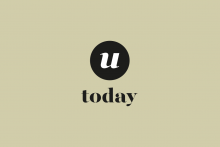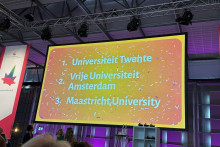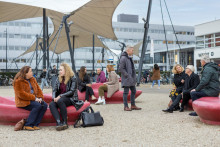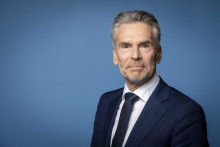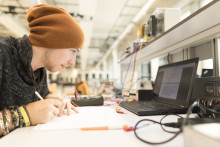‘Migrant children need positive role models’
After recently winning the Dutch ECHO Beta Technology Award – awarded to outstanding Dutch students from an ethnic minority background – Adil Acun will fly soon to California to reap the benefits of his prize: two weeks of free studies at the University of California. Marloes van Amerom talks to him on his motivation behind joining the contest and his wider aspirations and dreams. What inspired you to participate in the contest? ‘It seemed a good opportunity to show what migrant life is like here, in the east of the country. When discussing migrant issues and tensions, for example, one’s that are related to problematic youth, Dutch media usually focuses on the Randstad. I wanted to share the tale of migrants here, where, in my view, there is far less polarization than in the West. Migrants and ‘native’ Dutch have been living together without many problems for decades here. Possibly because people in Overijssel often feel like the underdog themselves, being located on the rim of the Netherlands and relatively neglected by politicians in the Hague and less-focused on in Dutch media. In your application you referred to yourself as a Dutch man and a Turk with a ‘hint’ of Overijssel. Do some of these identity components outweigh others depending on your location? ‘Yes, in the Netherlands I often feel more Turkish, and in Turkey more Dutch, surprising enough.’ The award is based on outstanding study results… ‘My grades have been quite good, I guess. Also, I am the first student in my department to finish an additional minor in the excellence stream.’ You also obtained the award for your “societal contributions.” What is this exactly? ‘At the Merkez Mosque in Deventer I set up a Homework Guidance Commission, which represents 11 people. Together we offer 60 pupils help with their homework, social behavior and, more generally, career development. Meanwhile, we emphasize that integrating in Dutch society and keeping one’s culture are not mutually exclusive. I feel it is important for these kids to have good role models, so they won’t get stuck with my generation’s identity problems ― forever struggling between being Turkish or Dutch. Prior to this time, I also taught maths at the Foundation IJssel Center in Deventer, which offers educational assistance to children, including those who are from disadvantaged backgrounds. It was there that I noticed that many kids who did enjoy math, physics and chemistry, and never opted for a natural science track. So now I am here to motivate them (chuckles).’ You volunteer in a Mosque. Is religion an important driver in your life? ‘Definitely. In the fourth grade, I felt very lost and rebellious and nearly dropped out of school. Meanwhile, it had always been my grandfather’s dream to take all of his grandsons to the Mosque. Sadly, he passed away before he could take me. That year, when I was back in Turkey, I decided to go on my own, as a tribute to him. Once in the local Mosque I felt a great inner peace. That night, I felt very happy watching the stars and decided I wanted to do something with science. Once at the UT I became even more enthusiastic. I feel treated like a junior scientist here rather than a mere undergrad. I also hope to continue with my Master’s here.’ But first sunny California is coming up… ‘Yes, I will attend two courses there: Speaking in Public and Film & TV Directing. The latter should be interesting with Los Angeles’ film studios nearby (laughs). But the sun is not a strong pull factor for me, actually. I’d originally planned a holiday in Central Asia, to visit some cool plains.’ Marloes van Amerom Acun: ‘I am dreaming of returning to Turkey one day, but somehow I cannot leave this tiny country, perhaps because my people still need me so much.’
